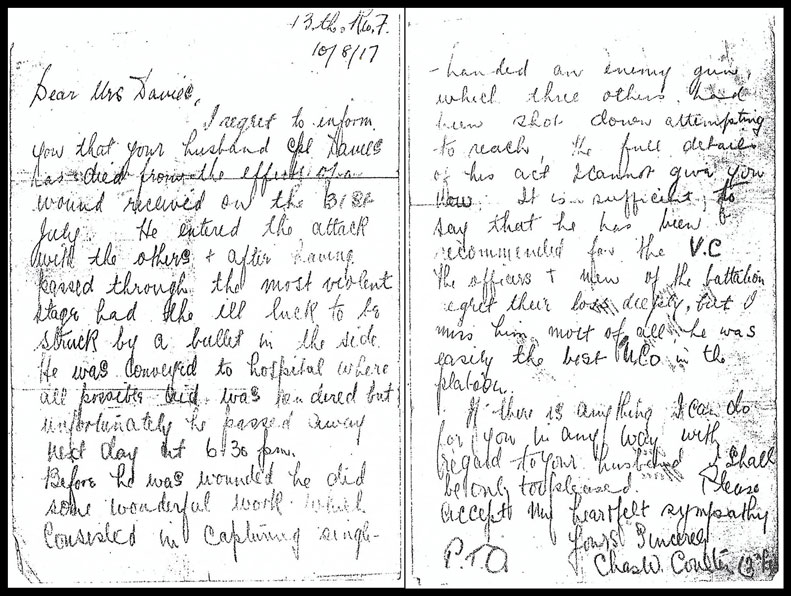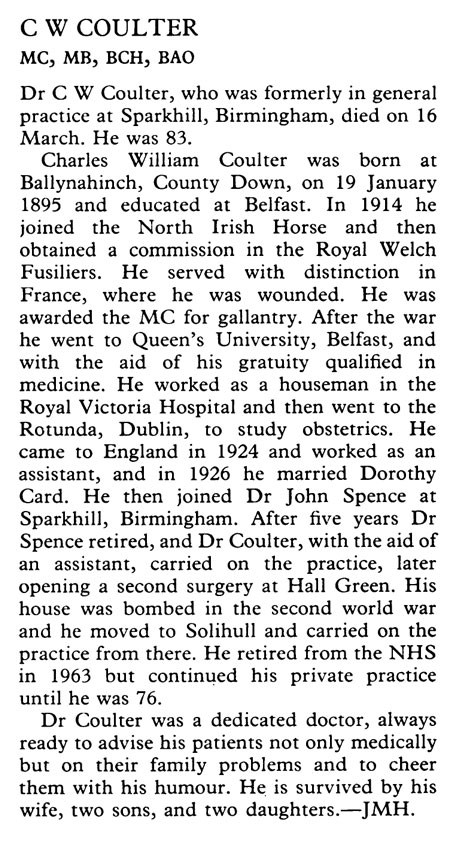Lieutenant Charles William Coulter, MC
Charles William Coulter was born on 19 January 1895 at Drumaness, Ballynahinch, County Down, the third of six children of carding master William Coulter and his wife Margaret Ann (nee Nelson).
He was educated at Belmont and Clifton College, Belfast, before working as a clothier's apprentice.
Coulter enlisted in the North Irish Horse at Antrim on 20 April 1915 (No.1490). He was promoted to lance corporal on 28 July and embarked for France on 10 January the following year as part of E Squadron, which was then serving as divisional cavalry to the 34th Division.
Two months later he applied for a commission in the infantry. The officer commanding the 34th Division, in recommending him for officer training, nonetheless wrote:
I have interviewed this N.C.O. and consider that he needs a much longer period of training, for a Commission in the Infantry, than is obtainable at the Cadet School.
Coulter returned home on leave on 5 May 1916 and the following July reported to the No.4 Officer Cadet Battalion at Oxford. On 22 November 1916 he was commissioned as a 2nd lieutenant and posted to the 3rd (Reserve) Battalion, Royal Welsh Fusiliers.
During 1917 Coulter was attached to the regiment's 13th Battalion and joined them in France, where he saw action in the attack on Pilkem Ridge on 31 July at the beginning of Third Ypres. Soon after, he wrote the following letter to the wife of one of the casualties of the attack, Corporal James Llewellyn Davies, who was later awarded a Victoria Cross.
Dear Mrs Davies
I regret to inform you that your husband Cpl Davies has died from the effects of a wound received on the 31st July. He entered the attack with the others & after having passed through the most violent stage had the ill luck to be struck by a bullet in the side. He was conveyed to hospital where all possible aid was rendered but unfortunately he passed away next day at 6.30 pm.
Before he was wounded he did some wonderful work which consisted in capturing single-handed an enemy gun which three others had been shot down attempting to reach. The full details of his act I cannot give you now. It is sufficient to say that he has been recommended for the V.C.
The officers & men of the battalion regret their loss deeply, but I miss him most of all, he was easily the best NCO in the platoon.
If there is anything I can do for you in any way with regard to your husband I shall be only too pleased. Please accept my heartfelt sympathy.
Yours sincerely
Chas W. Coulter (2nd Lt)I have just been told that your husband has been buried at Canada Farm Cemetery near Ypres.

Coulter remained with the 13th Battalion until the end of the war. He was promoted to lieutenant on 22 May 1918.
According to a report in the Belfast News-Letter about this time, Coulter was "a noted marksman, and in the earlier stages of his military career did splendid work as a sniper."
On 28 August 1918, as his battalion was advancing on the Somme front during the Advance to Victory offensive, Coulter was wounded in the right eye, the war diary for that day stating:
Reconnoitring patrols were sent out & reported Longueval & western edge of Delville Wood clear of enemy. A & C Coy occupied outpost line on Longueval Village. Lieut. C.W. Coulter wounded.
It was probably for his actions on this day, or the days immediately before, that he was awarded a Military Cross. The citation for the award read:
For conspicuous gallantry and devotion to duty. While bringing rations and ammunition up to the front line the road was heavily shelled, a mule being killed and the driver stunned. Sending the remainder of the convoy forward he and a N.C.O. dragged the driver to cover and removed the kit from the mule. He then caught up the convoy and delivered the whole of the rations and ammunition. On the return journey he was wounded, but brought his transport back to the lines. His determination ensured the delivery of the much-needed food and ammunition.
Coulter was hospitalised at Rouen, but it appears the wound was not severe, as he was able to rejoin his battalion later that year.
On 23 January 1919 he was demobilised. He relinquished his commission on 1 April 1920.
Coulter studied medicine at Queen's University Belfast from 1919 to 1924, before moving to Birmingham, where he lived at 578 Stratford Road. On 15 December 1926 he married Dorothy Card at St Edward's Church. By 1978 he was living at 7 Parklands Blossomfield Road, Solihull. He died on 16 March that year.

British Medical Journal, 13 May 1978
I am grateful to Mark Davies, great-grandson of Corporal Davies, for permitting me to reproduce 2nd Lieutenant Coulter's letter.
